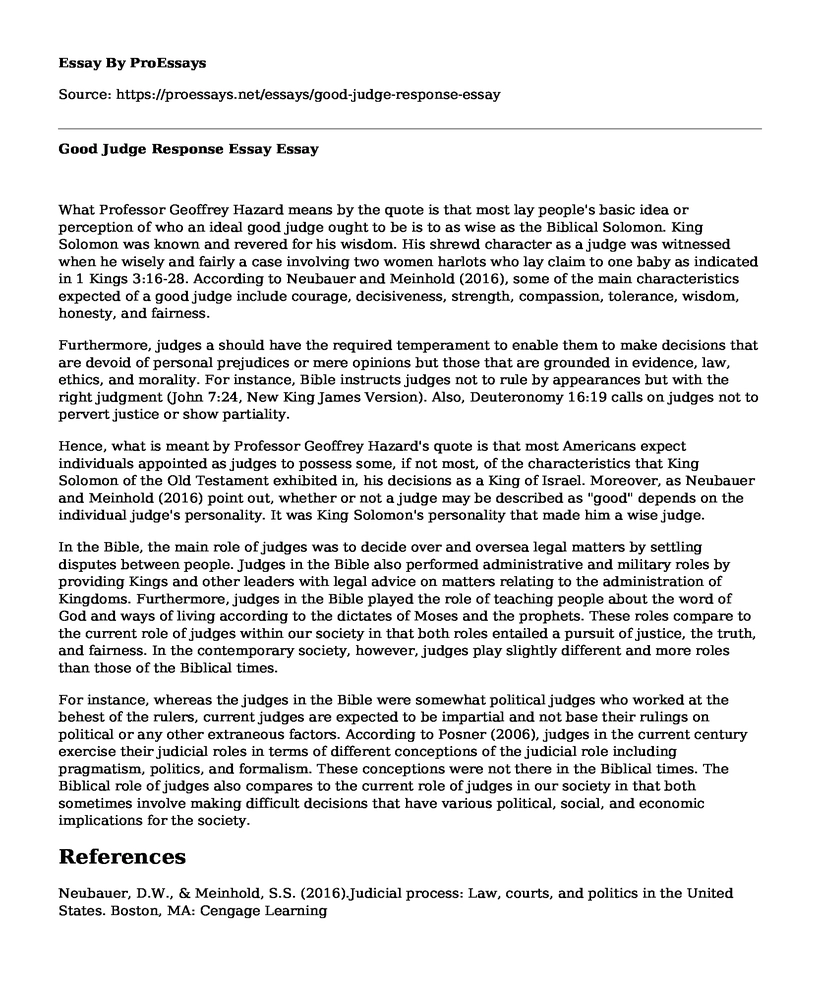What Professor Geoffrey Hazard means by the quote is that most lay people's basic idea or perception of who an ideal good judge ought to be is to as wise as the Biblical Solomon. King Solomon was known and revered for his wisdom. His shrewd character as a judge was witnessed when he wisely and fairly a case involving two women harlots who lay claim to one baby as indicated in 1 Kings 3:16-28. According to Neubauer and Meinhold (2016), some of the main characteristics expected of a good judge include courage, decisiveness, strength, compassion, tolerance, wisdom, honesty, and fairness.
Furthermore, judges a should have the required temperament to enable them to make decisions that are devoid of personal prejudices or mere opinions but those that are grounded in evidence, law, ethics, and morality. For instance, Bible instructs judges not to rule by appearances but with the right judgment (John 7:24, New King James Version). Also, Deuteronomy 16:19 calls on judges not to pervert justice or show partiality.
Hence, what is meant by Professor Geoffrey Hazard's quote is that most Americans expect individuals appointed as judges to possess some, if not most, of the characteristics that King Solomon of the Old Testament exhibited in, his decisions as a King of Israel. Moreover, as Neubauer and Meinhold (2016) point out, whether or not a judge may be described as "good" depends on the individual judge's personality. It was King Solomon's personality that made him a wise judge.
In the Bible, the main role of judges was to decide over and oversea legal matters by settling disputes between people. Judges in the Bible also performed administrative and military roles by providing Kings and other leaders with legal advice on matters relating to the administration of Kingdoms. Furthermore, judges in the Bible played the role of teaching people about the word of God and ways of living according to the dictates of Moses and the prophets. These roles compare to the current role of judges within our society in that both roles entailed a pursuit of justice, the truth, and fairness. In the contemporary society, however, judges play slightly different and more roles than those of the Biblical times.
For instance, whereas the judges in the Bible were somewhat political judges who worked at the behest of the rulers, current judges are expected to be impartial and not base their rulings on political or any other extraneous factors. According to Posner (2006), judges in the current century exercise their judicial roles in terms of different conceptions of the judicial role including pragmatism, politics, and formalism. These conceptions were not there in the Biblical times. The Biblical role of judges also compares to the current role of judges in our society in that both sometimes involve making difficult decisions that have various political, social, and economic implications for the society.
References
Neubauer, D.W., & Meinhold, S.S. (2016).Judicial process: Law, courts, and politics in the United States. Boston, MA: Cengage Learning
Posner, R.A. (2006). The role of the judge in the twenty-first century. Boston University LawReview, 86, 1049-1068
Cite this page
Good Judge Response Essay. (2022, May 09). Retrieved from https://proessays.net/essays/good-judge-response-essay
If you are the original author of this essay and no longer wish to have it published on the ProEssays website, please click below to request its removal:
- Case Study Example: Detective and Judges Points of View
- Is Organized Crime Evolving into a Conventional Business Model Style of Operations?
- Summary of Legislation in Juvenile Crime Essay Example
- Titus 2:11-12 "The Second Coming of Jesus" Essay Example
- Essay Example on Retributive Desert & Strict Liability: Punishing Beyond Culpability?
- Essay Example on Bob Shot Twice After Plan of Attack at LGBTQ Rally Discovered
- Paper Example on Understanding Worldviews: A Historical Perspective







